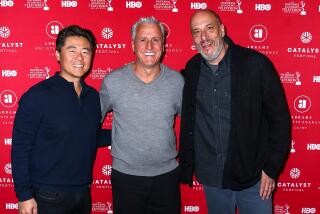Scott Lancaster Ad Agency Goes Out of Business : Marketing: Much of the company’s operations will shift to Evans Advertising. Other small ad firms may fold as the economy worsens.
- Share via
Yet another Los Angeles advertising agency has closed its doors. But this time, there may be a happy ending.
The feisty but struggling agency Scott Lancaster Mills Atha, best known for creating ads for toy companies, will close later this month. But its presence will hardly disappear from the Los Angeles advertising scene. Under an agreement announced Tuesday, four of its clients, three of its top executives and about half of its remaining employees will all join the Los Angeles office of Evans Advertising.
“By and large we took a good shot at it,” said Stephen C. Scott, 62, chief executive of Scott Lancaster, who will become executive vice president of marketing services at Evans. “Fifteen years in business is not a flash in the pan.”
Even then, the name Scott Lancaster Mills Atha will soon become part of Los Angeles advertising lore, and its estimated 14 employees will vacate the firm’s Century City office.
This marks the third Los Angeles agency to close this year. Last month, the tiny agency Albright/Labhart folded when its two parters decided to open separate businesses. In February, the agency Abert Newhoff & Burr closed after seven years in business.
“There will be more closings, acquisitions and mergers,” said Tom Burr, co-founder of Abert Newhoff & Burr, who is now senior vice president at Hakuhodo Advertising’s Los Angeles office. “Every time there is a recession, that is the fallout.”
Other executives concur. One tiny Los Angeles agency recently approached “headhunter” Jack Bernardy, chairman of Brown/Bernardy Inc., about helping it form a consortium of small agencies to go up against the big guns. Bernardy declined. But he says other Los Angeles agencies will face decisions like Scott Lancaster’s. “The big question mark,” he said, “is what will happen to the economy.”
Consultants also agree. “As ad budgets get tighter and the market shrinks, there’s no question more small agencies will turn to big agencies for survival,” said Laura Murphy, president of Baeder/Murphy Associates, a Beverly Hills-based executive search firm.
For Evans, which has roots in Los Angeles that go back to 1928, the move is an attempt to improve its creative product and bolster its client rooster. With the purchase, Evans picks up four clients that total about $8 million in billings, including Tomy America, Gund Inc., NoJo Infant Accessories and Cox Hobbies. The agency’s annual billings in Los Angeles now total $40 million.
“We’re trying to turn out better advertising and make Evans more important in this market,” said Jim Winters, who was named chief executive at Evans in February. “You’ll be seeing more of this in the next few years. Smaller agencies will be banding together.”
Meanwhile, agencies such as Evans--which are finding it increasingly hard to win clients during an advertising slowdown--can essentially buy them by swinging deals like this.
“I’d rather win new business by beating out Chiat/Day than by buying it,” said Winters.
Evans/Los Angeles is one of nine offices owned by Evans Communications of Salt Lake City. The Los Angeles office handles advertising for FHP Health Care and the Beverly Hills Hotel.
About half of Scott Lancaster’s employees--including most of its top executives--were hired by Evans. Among them, Peggy Lancaster was named executive vice president and co-creative director and Dave Mills becomes executive vice president and director of client services. Scott’s 36-year-old son, Clifford, has been retained as a consultant at Evans.
Although Scott Lancaster was considered a creative shop, it was stereotyped as one that mostly created ads for toy makers. As a result, it had a tough time landing other clients. Then, when Coleco Industries filed for protection from creditors under Chapter 11 bankruptcy in 1988, the agency lost its biggest client.
“This gives us a chance to work on something besides toy accounts,” said Scott. “We could never seem to break out of that mold.”
More to Read
Inside the business of entertainment
The Wide Shot brings you news, analysis and insights on everything from streaming wars to production — and what it all means for the future.
You may occasionally receive promotional content from the Los Angeles Times.










